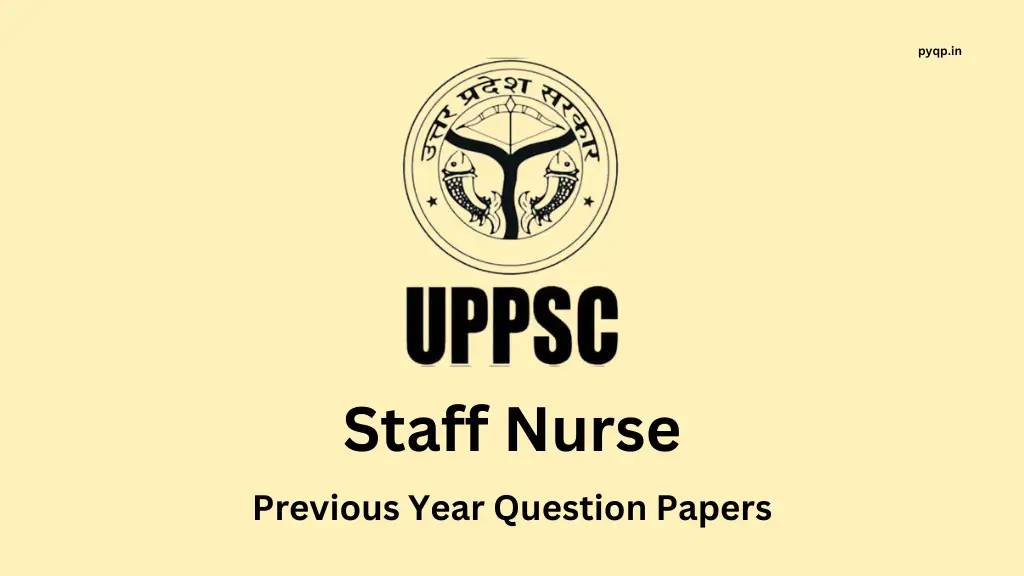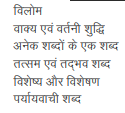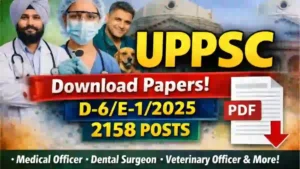UPPSC Staff Nurse Previous Year Question paper

This article provides UPPSC staff nurse previous year question papers. This exam is conducted by the Uttar Pradesh Public Service Commission (UPPSC).
Age
- Minimum Age – 21 years
- Maximum Age – 40 years
Fee
- General / OBC / EWS – Rs 125 /-
- SC / ST – Rs 65 /-
- PH Candidates – Rs 25 /-
Educational Qualification
| Type | Details |
|---|---|
| Academic Qualification | A candidate for direct recruitment to the post of Staff Nurse (Unani) must:- (I) Have passed the High School examination with Science and passed the Intermediate examination of the Board of High School & Intermediate Education, Uttar Pradesh or an examination recognized by the government as equivalent thereto; (ii) Possess a diploma in Medical and Surgical Nursing (Unani) registered with the Ayurvedic and Unani Tibbi Medicine Board of Uttar Pradesh. (iii) Possess a diploma in Midwifery (Unani) registered with the Ayurvedic and Unani Tibbi Medicine Board of Uttar Pradesh. (iv) Possess a registration certificate as a Unani Nurse and Midwife (Dhatri) from the Ayurvedic and Unani Tibbi Medicine Board of Uttar Pradesh. |
| Preferential Qualification | A candidate who has:- (1) Served in the Territorial Army for a minimum period of two years; or (2) Obtained a “B” certificate of National Cadet Corps, shall, other things being equal, be given preference in the matter of direct recruitment. |
UPPSC Staff Nurse Salary
- Grade Pay Rs 4600 /- (Pay Scale level – 7, pay matrix Rs 44900 – 142400)
Download UPPSC Staff Nurse Previous Year Question Papers
UPPSC Staff Nurse Exam Pattern
Preliminary Examination
| Paper | No. of Questions | Marks | Duration |
|---|---|---|---|
| General Knowledge | 30 | 15 | – |
| General Hindi | 20 | 10 | – |
| Nursing Unani Subject | 120 | 60 | – |
| Total | 170 | 85 | 2 hours |
Main Written Examination
In this phase, questions will be asked from the Nursing Unani Subject only.
- No of Question – 09 (05 + 04)
- Total Marks – 85 (25 + 60)
- Time (Duration) – 3 hours
UPPSC Staff Nurse Syllabus
1. GENERAL KNOWLEDGE
(1) History of India and Indian National Movement: In exploring the historical tapestry of India, candidates are encouraged to cultivate a nuanced understanding of the social, economic, and political dimensions of Indian history. When delving into the Indian National Movement, a synoptic comprehension of the freedom struggle, the evolution of nationalism, and the pivotal moments leading to Independence is expected.
(2) Indian and World Geography – Physical, Social, Economic Geography of India and the World: Geographical inquiries about India will encompass its physical, social, and economic facets. For world geography, a foundational grasp of the subject is anticipated, focusing on a general comprehension.
(3) Indian Polity and Governance, Constitution, Political System, Panchayati Raj & Public Policy, Rights – issues, etc: Exploration of Indian polity and governance will involve questions testing knowledge of the country’s constitution, political system, including Panchayati Raj and Community Development.
(4) Indian Economy and Social Development: Candidates will be evaluated on their understanding of issues related to population, environment, urbanization, as well as the broad features of economic policy in India and its rich cultural tapestry.
(5) Current Events of National and International Importance: This segment includes inquiries on contemporary events of national and international significance, with a spotlight on Games & Sports.
(6) Indian Agriculture: A general understanding of agriculture in India, covering agricultural produce and marketing, is expected from candidates in this section.
(7) General Science: In this category, questions will span a broad appreciation and understanding of science, including matters of everyday observation and experience. This encompasses the role of science and technology in India’s development.
(8) Elementary Mathematics up to Class 10th Level: Candidates are expected to exhibit proficiency in arithmetic, algebra, and geometry at the level of class 10.
Note: Candidates are advised to cultivate a well-rounded awareness of the aforementioned topics, with specific emphasis on their relevance to the state of U.P.
2. General Hindi

3. Nursing (Unani) Subject
Introduction and Fundamentals of Nursing
- Definition of Nursing, Special Features, and Historical Aspects
- Principles of Nursing Management
- Relation of Nurse with Patients
- Duties and Responsibilities of Nurse
- Special Training of Nurse in Recording Vitals
- Care and Maintenance of Wards
- Communication Skills, Data Collection, Record Keeping, and Reporting
- Sample Collection of Specimens and Precautions for Transportation
- Training for Bed Preparation, Bed Bath, and Self Bath
- General Care of Patients
- Nursing Assistance during Defecation and Urination
- History Taking, Body Examination, and Preparation for Investigations
Anatomy
- Introduction to Anatomy
- Anatomical Position and Related Terminology
- Histology of Skin and Applied Aspects
- General Anatomy of Bones, Muscles, Joints, and Their Applied Aspects
- General Anatomy of Body Systems and Their Applied Aspects
- General Anatomy of Head, Neck, Thorax, Abdomen, Upper Limbs, Lower Limbs, and Their Surface and Applied Anatomy
- Descriptive Information of Vessels, Nerves, Ligaments, and Membranes
Physiology and Basic Concepts of Unani Medicine
- Definition of Physiology and Its Aims, Objectives, and Scope
- General Physiology of Cell, Tissues, Lymph, and Various Body Fluids and Their Transportation
- General Physiology of Hemopoietic System and Its Applied Aspects
- General Physiology of Respiratory System
- General Physiology of Digestive System
- General Physiology of Cardiovascular System
- General Physiology of Nervous System
- General Physiology of Uro-Genital System
- Detailed Information on Blood Pressure, Recording Method, and Precautions
- Normal Range of Biochemical, Hematological, and Hormonal Values
- Definition of Ilme Tib, Aims, and Objectives
- Definition of Umoor-e-Tabiyah, Tabiyat, and Quwwat Mudabbir Badan
- Descriptive Knowledge of Arkaan, Mizaj, Akhlat, Aaza, Arwah, Afa’al, and Qua’a
Preventive and Social Medicine
- Definition of Sehat, Marz, and Arz
- Definition of Sabab and Its Classification
- Six Essential Factors of Life
- Effects of Seasonal, Environmental, and Emotional Factors on Health
- Detail Knowledge about Neonatal Care
- Detail Knowledge about Geriatric Care
- Specific Knowledge of Communicable Diseases
- Specific Knowledge of Epidemic Diseases
- Importance of Diet, Classification, Ingredients, Methods of Preparation of Different Diets
- National Schedule of Immunization
- General Knowledge of Vitamins and Essential Minerals
- Preparation of Diet as per the Needs of the Patients
- Effects of Poisoning and Their Management
- Knowledge of Common Poisons and Their Antidotes
- Effects of Scorpion Bites, Snake Bites, Insect Bites, and Their Primary Managements
Ilmul Advia and Saidala
- Definition of Dawa, Ghiza, and Their Classification as Dawa-e Ghizaee, Ghiza-e Dawaee, Jaiyyadul Kaimoos, Radiul Kaimoos, Saqeel, Lateef, Ghaleez, and Motadi Aghzia
- Identification of Single Crude Drugs and Their Temperaments
- Descriptive Knowledge about Preparation of Unani Compounds
- Aamale Saidala as Taqtee, Tahmees, Burada, Tashwiyah, Taseed, Taqsheer, Khisanda, Joshanda, Mudabbar, Sofoof, Sahaq – Method of Preparation and Uses
- Preparation, Preservation, Uses, and Doses of Araqiyat, Sharbat, and Kushtajat
- Ashkal e Advia and Its Classification
- Route of Administration of Drugs and Precautions
Medicine
- Effects of Disease in Human Body, Clinical Features, and Complications
- Concept of Diagnosis
- Methods of Examination (Inspection, Palpation, Percussion, Auscultation)
- Examination of Pulse and Its Types
- Examination of Tongue
- Examination of Excreta
- Examination of Gait
- Examination of Senses, Speech, etc.
- Use of Thermometer, Stethoscope, and Their Indications
- Definition of Moalij (Hakeem)
- Different Methods of Treatment in Unani System
- Amraz-e-Riya and Their Primary Managements (Suaal, Diq, Zeequnnafas, Shaheeqa, etc.)
- Amraz-e-Qalb and Their Primary Managements (Syncope, Angina, M.I., Palpitation, Hypertension)
- Amraz-e-Meda and Their Primary Managements (Ishaal, Haiza, Piles, Yarqaan, and Warm e Kabid)
- Diseases of Ear, Nose, Throat, Eyes, and Teeth – Signs, Symptoms, and Primary Managements
- Fever, Wajaul Mafasil, Niqras, Diabetes Mellitus, AIDS, Suzaak, Atishak – Symptoms, Signs, and Primary Managements
- Descriptive Knowledge of Dalk, Ruyazat, Hammam, Hijamah, Amale Tareeq, Qai, Ishaal, Fasd, Amale Kai – Methods, Types, and Uses
Specific and Surgical Nursing
- General Introduction to Surgery
- Injections (Subcutaneous, Intra-Dermal, Intramuscular, Intra-Vascular) – Methods and Preparation
- Use of Catheter
- Procedure Related to Surgery (Sterilization, Thermal Sterilization, Isolation of Patients)
- Pre-Surgical Preparation of Patient
- Post-Surgical Follow-Up
- Preparation of Operating Theater (O.T.) and Its Maintenance
- Preparation of Surgical Instruments and Their Maintenance
- Auto-Clave, Ventilation, Light, and Temperature Management of OT
- Role and Duty of Nurse in OT
- General and Local Anesthesia – Indication and Precautions
- Oxygen Therapy and Nebulization
- Different Types of Fractures and Their Management
- Surgical Diseases and Their Primary Management
- Details Observation of Patients, Record Keeping, and Reporting
- Packing of Dead Body
Amraz-e-Niswan, Qabalat wa Naumaulood
- Definition of Obstetrics and Gynecology
- Methods of P/V, P/S Examination
- Ante-Natal Care
- Monitoring of Fetal Movement, Fetal Parts, and Fetal Heart Sound
- Management of Labour
- Mechanism of Normal Labour
- Care and Maintenance of Labour Room
- Care and Maintenance of Neonatal Room
- Post-Natal Care
- Preparation of OT for Surgical Emergencies during Labour
- Care of Puerperal Period Diseases
- Methods of Abnormal Deliveries
- Gynecological and Obstetrical Diseases
UPPSC Staff Nurse Syllabus in English
UPPSC Staff Nurse Syllabus in Hindi
UPPSC Staff Nurse Notification
| Year | Download Link |
|---|---|
| 2023 Englsih | Click here |
| 2023 Hindi | Click here |
Previous Year Question Papers
| Paper Year | Question Papers | Answer Keys |
|---|---|---|
| 2023 (19th December 2023) | Click here | Series A Series B Series C Series D |
| 2022 (10th April) | Click here | – |
| 2021 (3rd October) | Click here | – |
| 2017 (17th December) | Click here | – |


